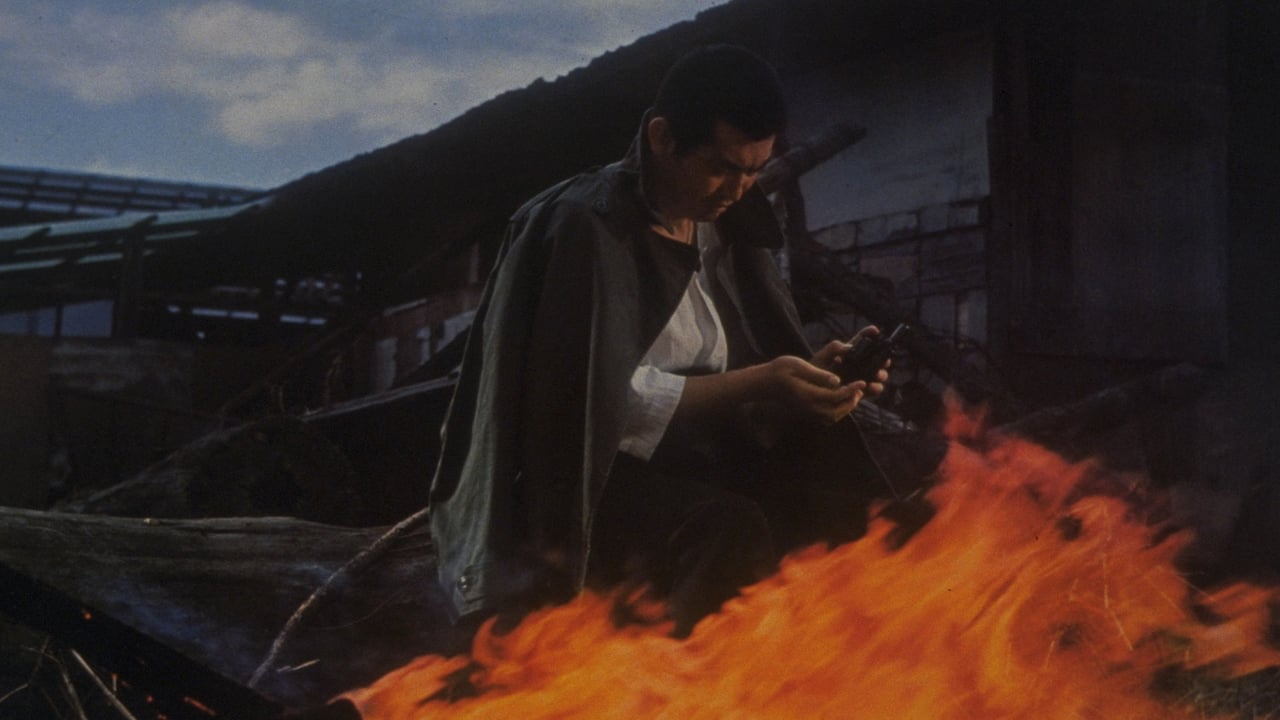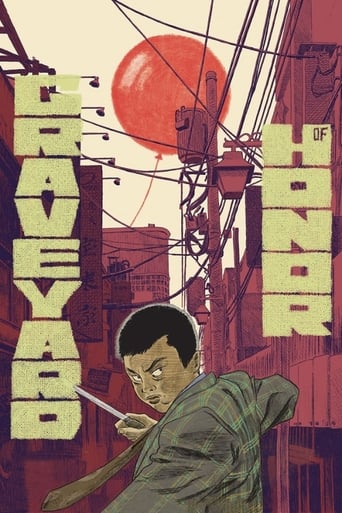Matialth
Good concept, poorly executed.
Deanna
There are moments in this movie where the great movie it could've been peek out... They're fleeting, here, but they're worth savoring, and they happen often enough to make it worth your while.
Cristal
The movie really just wants to entertain people.
Witchfinder General 666
The late Kninji Fukasaku is arguably most widely known for the more recent "Battle Royale" (2000), but the films that have earned him the deserved status as a true master of uncompromising cinema are arguably his gritty Yakuza films from the 70s. Such as the famous "Battles Without Honor And Humanity" films or this disturbing gem called "Jingi No Hakaba" aka. "Graveyard of Honor" (1975). Produced by the great Toei company "Graveyard of Honor" must be one of the most uncompromising and depressing Gangster portraits ever brought to screen, and it is also easily one of the most memorable Yakuza films I've seen. Unlike many other gangster films which somewhat glorify the Mafia, this is a a brutal, uncompromising utterly grim portrayal of organized crime and one criminal in particular. Set in Japan of the late 1940s, "Graveyard of Honor" tells the story of real-life Yakuza Rikio Ishikawa (I don't know how accurate it is, though) in a disturbing and highly memorable manner.Tokyo, 1946: thug Rikio Ishikawa (Tetsuya Watari) outshines all of the fellow members of his Shinjuku Yakuza family - in madness, brutality and irascibility. His spontaneous outbursts of violence are dreaded by both enemies and associates. When he increasingly begins to attack associates and even superiors, he becomes an outcast... Unlike many Gangster characters Ishikawa isn't really likable in any way. He is portrayed as a violent madman who rapes, brutalizes and murders apparently for no reason. However, in a way, one does feel sorry for him. Overall, this tough and seemingly soulless beast of a man who is feared by even his criminal peers, is also a pitiable creature unable to find any joy in life. Tetsuya Watari is brilliant in his role of the uncontrollably violent yet pitiable maniac criminal. The only truly likable character in the film is Ishikawa's girlfriend (played by the beautiful Yumi Takigawa), who sticks with Rikio, the man who has raped her and made her a prostitute. Her story is the doubtlessly most heart-breaking part of the film. The supporting cast includes many familiar faces for fans of Japanese cinema, including Eiji Go ("Tokyo Drifter", "The Executioner", etc.) and the beautiful Exploitation-Princess Reiko Ike ("Sex And Fury", "Female Yakuza Tale", "Criminal Woman: Killing Melody",...) of whom I'm a big fan. The film is brilliantly shot in a very unique style, and seems very realistic and authentic. The violence is brutal, blood and uncompromising as the film itself. Overall, "Graveyard of Honor" is a truly remarkable film that must not be missed. Takashi Miike made a remake in 2002, but although I am a (moderate) Miike-fan I doubt that it's anywhere near as good as this one. This brutal, disturbing, sad and often depressing portrait of a violent madman must be one of the most uncompromising crime films ever made and no lover of Japanese cinema can afford to miss it.
chaos-rampant
The bittersweet irony of Fukasaku was that he was a talented man that only became known to us through his last film. So it's enthralling to discover small gems like this when in the West we were praising Scorsese for his grittiness.It helps to know a bit about this type, the yakuza film. Fukasaku's The Yakuza Papers series offer all the introduction you're going to need. If you are acquainted this will come as a pleasant surprise. The plot is nowhere near as convoluted, the barrage of constant name-dropping that made the former occasionally hard to follow is absent. Instead we get the distilled energy, with hand-held cameras peering from the most improbable angles, filming the numerous fights not from a distance but in the middle of the swirl. We get stills, narration, clever use of sepia, fast forwards and so on, years before Tarantino made it cool. Yet what sets Graveyard of Honour apart from other yakuza movies is the protagonist. He's not the typical rags to riches and back figure seen in gangster movies. He doesn't hit the good time before falling down, he's not Tony Montana. No, it's all down-hill for him; a self-destructive yakuza without a care in the world who brings about his own misery and challenges his bad karma at every corner. His nihilistic stare reminded me of Ryonosuke Tsukue from Sword of Doom.Strongly recommended for crime drama fans.
Scarecrow-88
This is a glorified, down-beat & grim "biopic" of a Yakuza madman named Ishikawa(Tetsuya Watari, who plays him as a quiet calm before the tornadic release)who has this mentally unstable nasty streak that comes out in a fiendish explosion when others stand in his way. He almost causes a clan war when he attacks a rival Yakuza lord from another city. This causes a downward spiral for him as his seemingly uncontrollable path of violence and death leads to a vicious attack on his own Kawada Yakuza Godfather and a banishment from all clans for ten years, which is part of the code. After a brief stint in prison he's ordered to stay in Osaka for the remaining ten and would be allowed back once he served his time. After only a year, Ishikawa returns to cause havoc once again. While in Osaka he developed a drug habit which would lead him down an even more violent path for he would find those in possession of what he needed and threaten their very lives if they wouldn't fork over product to stick in his arm. His only real ally is a tragic geisha, Chieko(Yumi Takigawa), who is slowly dying..but, even she suffered rape from Ishikawa showing that he has no real respect for anyone when it comes to getting his own degree of satisfaction by any means necessary. When he attacks the godfather of the Imai clan, no real avenue of escape will ever be available again. He often seems unkillable as attempts on his life are frequent, though he is often cunning through his hiding(..and also not so cunning when he appears in public at gambling houses). When he kills the Imai Godfather, his life expectancy shrinks considerably.The film is told in a documentary form with narration depicting a specific tumultuous time in the late forties when clans operated almost like little governments dictating business within the city of Shinjuku. Each has their turf and tries to remain loyal to each other hoping to escape any means of war. All Japanese loathe a specific group of foreigners nicknamed "the thirds" making up mostly Korean, Taiwanese, & Chinese who seem to try to live within the city but are treated as the plague of the country. We also see how the loss to America in the World War seems to have created a child without it's parents as this massive collective of people frequent the streets in droves. The Yakuza clans do seem to be the only means of parent-ship available to those without a home or identity. The film is ultimately a blitzkrieg of gang wars, prostituting whores, "black-market" elections, gambling, drugs, and Ishikawa is immersed within the frenzied structure..he's certainly a doomed creature because how can such a crazed heathen as he ever survive? The film has wildly imaginative camera-work which seems to show an unbalanced world through the gaze of Ishikawa. It has visual verve and is certainly loaded with bloody carnage.
elclown
Kinji Fukasaku is worldwide known for his Yakuza movies, different from the typical overall view the cinema had from Yakuzas. This movie is a good example of how far some yakuzas are from honor or pride.Fukasaku films Jingi no hakaba (Graveyard of Honor) as a mockumentary (fake documentary) which gives more emphasis to the actual yakuza situation. This movie follows the story of Ishikawa, the archetypical post-war gangster (as it's defined in the film). The character development is great, and very surprising. However, you may loose the plot in some points if you don't have an overall knowledge of the Yakuza organization.In conclusion, a very entertaining gangster movie the Japanese way. I hugely recommend for anyone looking for the roots of most of the Japanese and Hong Kongese gangsters movies nowadays (Takashi Miike, Takeshi Kitano, John Woo, etc.), you won't get disappointed.

